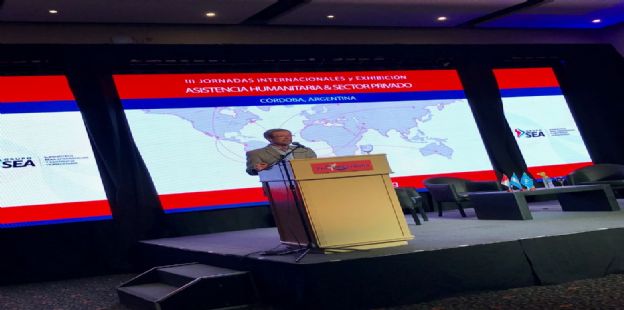
The Third Conference on Humanitarian Assistance and the Private Sector welcomed important national and international speakers. Companies and businesses from Córdoba had the opportunity to exhibit products and services that provide humanitarian assistance solutions for natural disasters.
One of the distinguished speakers was UN World Food Program in Panama’s Francisco Quesada, who talked about the humanitarian response depots and explained,
“The purpose of my presentation is for Cordobese companies offering humanitarian products to learn about how to use our services or enter into contracts with us, so that they can join our activities, as companies from other countries have.”
“These events give us the opportunity to learn about new humanitarian assistance solutions. What I found particularly interesting was the exhibit by BOX Synergy. I intend to contact them to get a better insight about their product, try it, and, if necessary, hire their services,” concluded Quesada.
The event included the exhibition of products and services offered by Cordobese companies. Also present was the Emergency and Humanitarian Assistance Supplies Group “Grupo SEA”, represented by CIS Group’s Business Development Manager Rodrigo Fernández, who talked about the support provided by the company in relation to communication aspects,
“We develop telecommunication solutions for the private, public and international markets. CIS Group provides rapid deployment solutions to re-establish communications in the face of earthquakes, floods or other natural disasters.”
Fernández also praised the event for offering the opportunity to establish or strengthen relations with international institutions, and thus aid the internationalization of local businesses.
For his part, ProCórdoba’s General Manager Roberto Rossotto, stressed the importance of organizing these events and said,
“This new edition of the Conference is part of a three-year old project that seeks to bring together the private and public sectors with regard to emergencies and humanitarian aid, because we know that both sectors have needs. It is necessary for them to be given a space for interaction, so that the demands of the public sector can be satisfied by the solutions offered by the private sector.”
When asked about her appraisal of the Conference, ProCórdoba’s Cooperation and International Relations Manager Viviana Arias — who also coordinated the event — shared her thoughts,
“The private sector has a lot to offer when it comes to meeting humanitarian challenges, whether by providing supplies or sharing expertise with regard to the logistics, distribution or other aspects. Córdoba, in particular, has a strong entrepreneurial ecosystem and exporting firms that are capable of generating new solutions for this ‘humanitarian market.’”
Arias also referred to the challenge that ProCórdoba faces when it comes to bringing together the private and the humanitarian sectors, the latter of which needs very specific products, services and innovations. She explained that the Agency has worked hard to maintain interest in these Conferences and raise awareness about the importance of humanitarian challenges in the province and the world.
The event welcomed representatives from the provincial, national and international levels. The United Nations Humanitarian Response Depot in Panamá, which is managed by the World Food Program and serves all the world with a focus on our region, was present through a representative.
Other participants included risk and response management authorities from Peru, Paraguay and Chile, who explained how they work when humanitarian needs arise and invited companies to become reliable suppliers in the market.
Finally, important academic and scientific institutions also took part in the event, among them, the National Commission on Space Activities (in Spanish, CONAE), the Ministry of Science and Technology of the Province, UCCFARMA Laboratory of the Catholic University, and UNICEF.
The presence of these actors recognizes the province as a humanitarian assistance hub where various institutions can find products to satisfy their needs.

